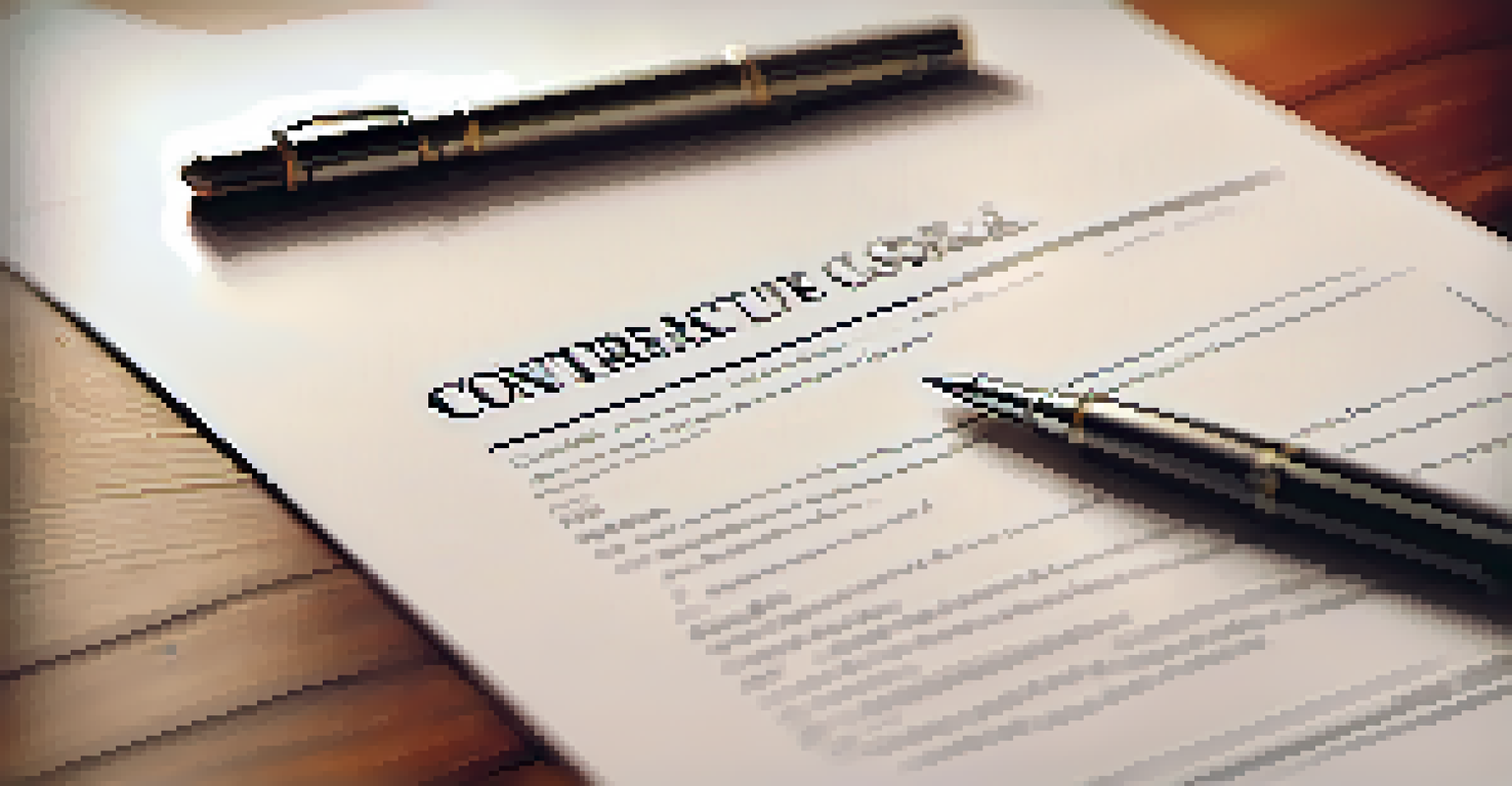How to Negotiate Terms in Real Estate Contracts Effectively

Understanding the Basics of Real Estate Contracts
Before diving into negotiations, it's vital to understand what a real estate contract entails. At its core, a real estate contract is a legally binding agreement between a buyer and a seller. This document outlines the terms of the sale, including price, contingencies, and timelines, ensuring both parties fulfill their obligations.
In any negotiation, the goal is to find common ground and create a win-win situation.
Familiarizing yourself with the key components of a contract can empower you during negotiations. Common elements include the purchase price, closing date, and any contingencies like financing or inspections. By knowing these details, you can better identify areas where you can negotiate more favorable terms.
Moreover, having a grasp on common industry practices can also provide leverage. For example, knowing that sellers often expect to counter offers can help you prepare your strategy in advance, allowing you to negotiate confidently and effectively.
Do Your Homework: Market Research is Key
Effective negotiation starts with thorough market research. Understanding the local real estate market can give you insights into property values, trends, and current inventory levels. This information not only helps you make informed offers but also strengthens your position when discussing terms.

For instance, if you discover that similar properties are selling for less than the asking price, you can use this data to justify a lower offer. Similarly, if inventory is low, you might find that sellers are less willing to negotiate, which can inform your approach.
Key Elements of Real Estate Contracts
Understanding crucial terms like price, contingencies, and timelines can empower you during negotiations.
Additionally, consider researching the seller’s situation. Knowing whether they are in a hurry to sell or if they have multiple offers can drastically change your negotiation tactics. Tailoring your strategy based on this information can lead to a more successful outcome.
Establishing Your Priorities in Negotiation
Before entering negotiations, it’s crucial to establish your priorities. Are you more concerned about the price, closing date, or specific contingencies? By identifying what matters most to you, you can focus on negotiating those terms effectively while being flexible on less important aspects.
The most important thing in communication is hearing what isn’t said.
For example, if getting the lowest price is your top priority, you might be willing to compromise on the closing date or other fees. This approach not only demonstrates your willingness to cooperate but also helps in creating a win-win situation for both parties.
Furthermore, having a clear list of must-haves versus nice-to-haves can help you stay organized and focused during discussions. This clarity can prevent you from getting sidetracked by less significant details, ensuring you achieve your main objectives.
Building Rapport with the Other Party
Negotiation isn't just about numbers; it's also about relationships. Building rapport with the other party can create a more amicable environment for discussions. Simple gestures, such as showing genuine interest in their reasons for selling, can go a long way in establishing trust.
For example, if you learn that the seller is moving for a job opportunity, acknowledging their situation can help you connect on a personal level. This not only makes the negotiation more pleasant but may also encourage the seller to be more flexible with their terms.
Importance of Market Research
Thorough market research helps you understand property values and strengthens your negotiation position.
Moreover, maintaining a friendly demeanor can lead to better communication. The more comfortable both parties feel, the easier it is to discuss terms openly and find common ground.
Effective Communication Techniques to Use
Clear and effective communication is vital in negotiations. Use simple language and be direct about your needs and expectations. This helps to avoid misunderstandings that can lead to frustration or conflict during the negotiation process.
Active listening is equally important. When the other party speaks, make sure you are fully engaged and understand their points. This not only shows respect but also allows you to respond appropriately to their concerns, which can enhance the overall negotiation experience.
Additionally, asking open-ended questions can facilitate more in-depth discussions. Instead of yes-or-no questions, try asking, 'What are your thoughts on this offer?' This encourages dialogue and can reveal valuable insights about the other party's priorities.
Knowing When to Compromise and When to Stand Firm
Negotiation often involves give-and-take, but knowing when to compromise is essential. While it’s important to be flexible, you should also have a clear understanding of your non-negotiables—those terms that you simply cannot budge on. This balance is key to achieving a favorable outcome.
For instance, if the seller is adamant about a higher price but you have a strict budget, consider negotiating other terms, like repairs or closing costs. This approach allows you to find a middle ground without sacrificing your financial limits.
Balancing Compromise and Firmness
Knowing when to be flexible and when to stand firm on non-negotiables is essential for effective negotiation.
On the flip side, there are moments when you should stand firm. If a term is crucial for your financial security or peace of mind, don’t be afraid to assert your needs. Remember, effective negotiation is about finding solutions that work for both parties without compromising your own priorities.
Finalizing the Agreement and Next Steps
Once you’ve reached an agreement, it’s time to finalize the contract. This is where having a real estate attorney or agent can be invaluable. They can review the terms to ensure everything is in order and that no crucial details are overlooked before signing.
Additionally, be prepared for the possibility that negotiations may continue even after the initial agreement. Depending on inspections or financing, there may be further discussions needed to address any issues that arise. Staying flexible and open to dialogue is vital at this stage.

Finally, once all terms are agreed upon and the contract is signed, make sure to keep a copy for your records. Staying organized with all documents will not only help you stay on track but also prepare you for the next steps in the buying process.